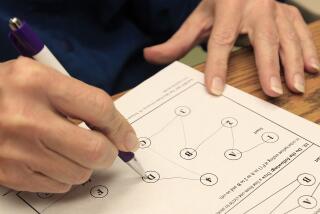Your aging brain: Is it ‘use it or lose it’?
- Share via
Yes, your brain is like a muscle: If you don’t strengthen and stretch its capacities, it will not deliver high performance.
But your brain is not like one of those forgiving muscles that lets you engage in a lifetime of indolence and then perks up willingly when you take up weight-training upon retirement. No, your brain is more like one of those muscles that will reward you for having worked it across the full length of your lifespan.
Which is not to say that engaging in lifelong mental calisthenics will protect you from cognitive decline in the end: New research has found that it probably will not.
But while late-life slides in mental performance afflict both the intellectually fit and the disengaged, people who stayed cognitively active will probably start their age-related mental descent from a higher perch. The downward trajectory of these two groups may be no different, but they appear to bottom out in different places.
If you’ve spent your life in what the study authors call “mentally effortful pursuits,” that’s supposed to be good news.
Welcome to the slightly less whimsical side of the annual BMJ “Christmas issue,” given over yearly to some of medicine’s silly and self-indulgent questions. This study, conducted by researchers in the United Kingdom, tackles the “use it or lose it” conjecture — the widely held belief that a person can maintain or enhance his or her cognitive function, and offset age-related declines in mental performance, by engaging in intellectual “exercise.”
The authors’ conclusion: “Investment in problem-solving throughout life could enhance cognitive performance, providing an individual with a higher cognitive point from which to decline.”
When older loved ones open a holiday gift of brain teasers, a chessboard or Sudoku puzzles, you can cheerfully remind them that such lifelong mental exercise will probably arrest their eventual mental slide at a slightly higher point than might otherwise be the case.
“Surely, this is as good a gift as any!” the authors write cheerily.
These findings were based on the kind of long-running study of cognitive health you just don’t find every day: On a single June day in 1947, every 11-year-old child who went to school in Scotland was administered the same standardized intelligence test. When those schoolchildren turned 64 around the year 2000, researchers caught up with a group of close to 1,000 Scotsmen and women who were tested in Aberdeen and who could still be found in that city.
With a standard measure of childhood intelligence in hand, the researchers recruited just shy of 500 of these people for further study. They recorded the level of education each had attained and gauged each recruit’s ongoing level of intellectual engagement. The researchers set out to follow these Scots for roughly the next 15 years, testing two dimensions of their cognitive health — mental speed and verbal memory performance — four times as they aged.
In the end, the study allowed the researchers to compare the cognitive trajectories of 98 subjects essentially from grade school to the age of 82. While the study’s recruits differed in their levels of ingoing intelligence, educational attainment and lifelong intellectual engagement, the researchers could measure and account for these factors to show how they influenced cognitive aging in recruits.
Not surprisingly perhaps, a child’s intelligence tended to drive educational attainment. And both of those factors in turn tended to drive lifelong intellectual engagement, the study found. But even after accounting for those factors, the researchers found that the greater the engagement in problem-solving over the lifespan, the higher a person’s late-life cognitive performance level tended to be. And then — yes — it was downhill from there.
The authors, led by researchers at the University of Aberdeen, stress that since the study is observational, it’s not possible to infer that any factors linked to cognitive change actually cause such decline. Unmeasured factors, such as aspects of an individual’s personality, “may govern how much effort older people put into such activities and why,” they note.
The findings are generally consistent with the finding that people who are more highly educated, and whose career paths involved more intellectual challenge, build a “cognitive reserve” that can delay the worst depredations of dementia. Compared to people with less “cognitive reserve,” such people appear to navigate daily challenges for longer despite having the physical hallmarks of advanced dementia in their brains.
You can’t give cognitive reserve, such as a streaming subscription, for the holidays. But if you’re hoping to ward off dementia and recognize friends and family for years to come, here are a few gifts from me to you that might help. Happy reading … and remember to stay engaged!
You might be surprised at the contribution of hearing loss
Exercise your body to save your mind
It’s not one thing: It’s a bunch of things.
Control your blood pressure, and start early!
Be smart for longer: Eat your vegetables
Loneliness is bad for your aging brain
Sleep plays an incredibly important role
MORE IN SCIENCE







